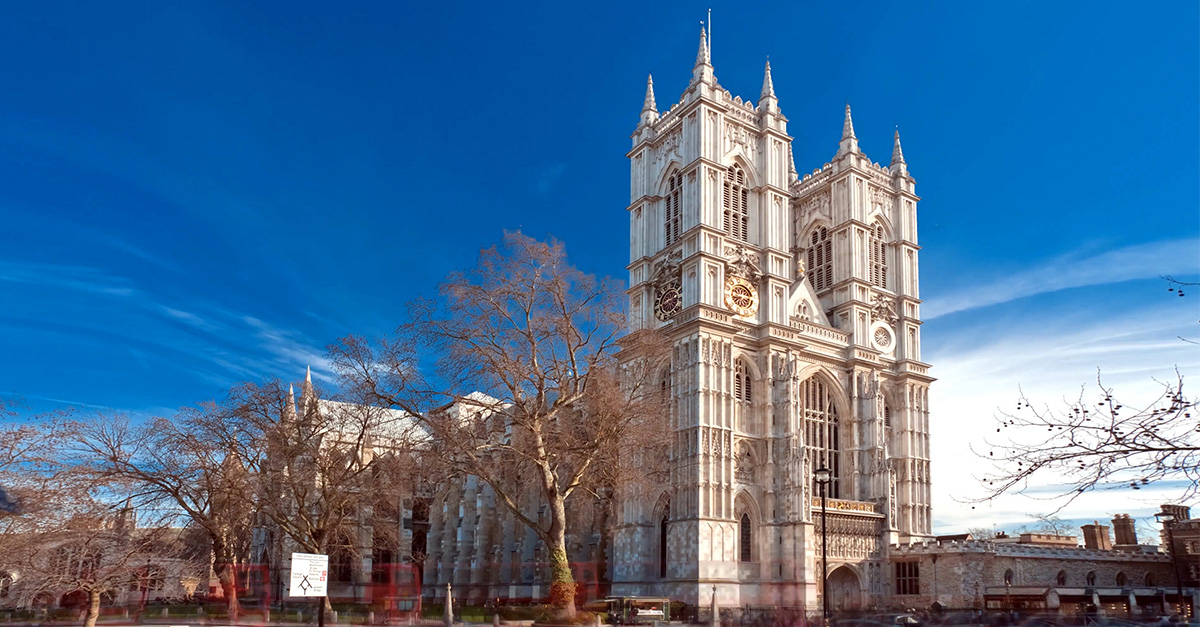


Get a free copy of Parental Rights & Education when you subscribe to our newsletter!

“Allowing the ‘blessing’ of same-sex relationships is essentially enabling the blessing of sin; that is dark. Christ taught us that we are all sinners, but that we should repent, ask his forgiveness, and turn away from our sins. The Church is now attempting to undermine the Word of God by encouraging people to live in sin.”
–CALVIN ROBINSON
In a series of stunning announcements this week, the Church of England (CoE) has given up on its shaky battle against radical gender ideology, voting to bless same-sex marriages and atone for its biblical stance on marriage, while also launching a project to begin embracing gender-neutral language for God.
Over the last several decades, the CoE has been a leader in mixing worldly ideologies with biblical truth, giving in and allowing changes to some church doctrines while trying to hold fast to others. In the early 1990s, after a few decades of grappling with the feminist revolution, it began ordaining women into the priesthood. In 2008, a decade after the Anglican Communion passed a resolution stating that “homosexuality is incompatible with Scripture,” it ordained a bishop who was an open, practicing homosexual.
The slippery slope continued yesterday. A quarter-century after church leaders upheld the biblical teaching that marriage is between a man and a women, the General Synod voted in favor of offering prayers for God’s blessing on same-sex couples and to “lament and repent” for not being welcoming towards members of the LGBTQ community in the past.
The vote passed 250-181. In a statement, the Synod explained,
“For the first time, the Church of England will publicly, unreservedly and joyfully welcome same-sex couples in church. The Church continues to have deep differences on these questions which go to the heart of our human identity.”
Despite the vote, many clergy and church members immediately spoke out against the change. Among them was Calvin Robinson, who has claimed that the CoE blocked his ordination over his “conservative theological views” and is now a deacon with the Free Church of England. He stated,
“Allowing the ‘blessing’ of same-sex relationships is essentially enabling the blessing of sin; that is dark. Christ taught us that we are all sinners, but that we should repent, ask his forgiveness, and turn away from our sins. The Church is now attempting to undermine the Word of God by encouraging people to live in sin.”
In its statement, the CoE attempted to alleviate any concerns that those who voted against the new policy will be forced to participate or be punished, saying,
“As Archbishops, we are committed to respecting the conscience of those for whom this goes too far and to ensure that they have all the reassurances they need in order to maintain the unity of the Church as this conversation continues.”
That statement flies in the face of comments made and actions taken in the days leading up to the vote. In late January, the Archbishop of Canterbury, Justin Welby, promised LGBT activists that he would “launch a disciplinary process” against church leaders and clergy who “condemn” homosexuality. “We’ll root them out!” he declared.
Welby made his declaration in response to an LGBT protester who claimed that Stephen Kaziimba, the archbishop of Nigeria, said that parents would be better off drowning their children than letting them be gay. In reality, Kaziimba, in a Christmas homily that can be seen on video, condemned those who recruit children into homosexuality, reminding them of Christ’s warning in Luke 17:2. He preached:
“I want to alert all students, parents, and teachers that there are bad people trying to attract children into homosexuality by promising money and sponsorship…To those who are recruiting children into homosexuality, I want to sound a very strong warning to you. These are not my words but the words of Jesus: ‘If anyone causes one of these little ones…to stumble, it would be better for them to have a large milestone hung around their neck and to be drowned in the depths of the sea.’”
Welby responded immediately by telling the LGBT activist, “Send me the details with that bit on paper and their names at the bottom of it and I’ll take action.”
Not long after that, Welby and the Right Rev. Stephen Cottrell, the Archbishop of York, took the unprecedented step of sending a letter to Sam Margrave, an elected member of the General Synod, rebuking him for his tweets. Among other things, these tweets discussed the “Christian incompatibility of Pride,” said the CoE was “seeking to bless sin,” and condemned society’s push to sexualize children.
The letter came three months after the Bishop of Coventry had reported Margrave to the local police for his tweets and asked them to launch a “hate crime” investigation. Margrave has since received death threats and has had to hire security when attending Synod meetings.
In their rebuke, Welby and Cottrell told Margrave that his tweets and comments had “caused other members to feel intimidated, bullied and distressed and we are dismayed by this. Not only have the things you’ve said lacked nuance, they have failed to distinguish between serious allegations of criminal behaviour of specific individuals and the wider law-abiding LGTBQI+ community.”
The two archbishops demanded that Margrave apologize, moderate his language on future social media posts, and “refrain from making generalized language of the behavior of LGBTQI+ people.”
They then warned him that membership in the General Synod is “a privilege” and a “way in which we serve before God” and that he needed to behave according to the Synod’s code of conduct in order to maintain public trust and confidence. They closed with, “I trust that we can expect you to display this.”
This was followed soon thereafter by the announcement that the CoE will launch a project this spring to consider whether or not to refer to God in gender-neutral terms.
The impetus for announcing this publicly was a request from Rev. Joanna Stobart of the Diocese of Bath and Wells to the church’s liturgical commission leader, who asked that the CoE consider adopting gender-neutral language.
However, the CoE has been quietly “exploring the use of gender language in relation to God for several years,” according to the Right Rev. Michael Ipgrave.
In 2018, Welby was quoted as saying, “All human language about God is inadequate and to some degree metaphorical. God is not a father exactly the same way as a human being is a father. God is not male or female. God is not definable.”
Since then, there has been an ongoing effort by priests and bishops to effect this change in church teachings, hymns, prayers, and carols.
A CoE spokesperson nonetheless said that there are “absolutely no plans” to substantially change or abolish “currently authorized liturgies,” as that would require the CoE to pass new legislation.
The Women and the Church (WATCH) group, a national campaign group pushing for gender equality in the CoE, are encouraging the project to “look at the development of more inclusive language in our authorize liturgy,” adding, “We hope that a proposal will be brought to Synod soon, as we believe that a theological misreading of God as exclusively male is a driver of much continuing discrimination and sexism against women.”
Not all members of the General Synod agree with this change. Rev. Ian Paul warned that abandoning exclusively male pronouns for God would “move the doctrine of the church” away from Scripture. He explained,
“The use of male pronouns for God should not be understood as implying that God is male, which is a heresy. God is not sexed, unlike humanity. The Bible uses feminine imagery and metaphors of God, but primarily identifies God using masculine pronouns, names, and imagery… The fact that God is called ‘father’ can’t be substituted by ‘mother’ without changing meaning, nor can it be gender neutralized to ‘parent,’ without loss of meaning.”

Of course, this was inevitable. In Ephesians 5, the Apostle Paul warned about the dangers of inviting non-believers and unrepentant sinners into the Church and enabling or condoning their sin. It might not seem like a big deal, but as Paul expounded on in Galatians 5:9, “A little leaven leaveneth the whole lump.”
Allowing false ideas and doctrines — no matter how seemingly innocuous — to creep into a church will soon corrupt the church’s focus, credibility, and purpose.
The leaders of the Church of England have spent decades insisting that they can submit to progressive culture but still stand strong in their defense of the faith, that they can simply tweak and update biblical truths to suit modern sensibilities.
As with other progressive “churches,” the Church of England’s decision-making has followed the same downward spiral, leading to apostate doctrine and the worship of a re-made deity that suits their self-focused agenda. Not surprisingly, after embracing those whose sole mission is to glorify themselves and their feelings, Welby and other church leaders have unleashed a “witch hunt” against faithful clergy and General Synod members who still believe in biblical truths.
Even now, as they have voted to affirm and celebrate sexual perversion, as well as to change the very nature and character of God as defined in Scripture, these church leaders continue to lie to themselves. They insist they will not conduct official marriage ceremonies for homosexual couples in their chapels and cathedrals, so that is evidence that they are being faithful to God and His commands.
Who do they think they’re fooling? The demands to compromise and give in will continue, and it will only be a matter of time before they do — on the marriage issue, and the next issue and the next and the next.
Just as you can’t have a little bit of cancer, you can’t be a little bit “woke.” Once introduced, these counterfeit entities will quickly spread and not stop until they infect the entire body. Death is inevitable unless effective treatment is administered — and administered quickly.
1 John 1:6, ESV, says, “If we say we have fellowship with him while we walk in darkness, we lie and do not practice the truth,” while verse 10 says, “If we say that we have not sinned, we make him a liar, and his word is not in us.”
The only medicine that will heal the Church of England is God’s Word, nothing more, nothing less.
Without it, the Church of England can expect to go the way of many other once-strong Western institutions: watered-down, washed up, and largely symbolic rather than significant.
Ready to dive deeper into the intersection of faith and policy? Head over to our Theology of Politics series page where we’ve published several long-form pieces that will help Christians navigate where their faith should direct them on political issues.
Christian conservative news and issues that matter. Curated just for you!
